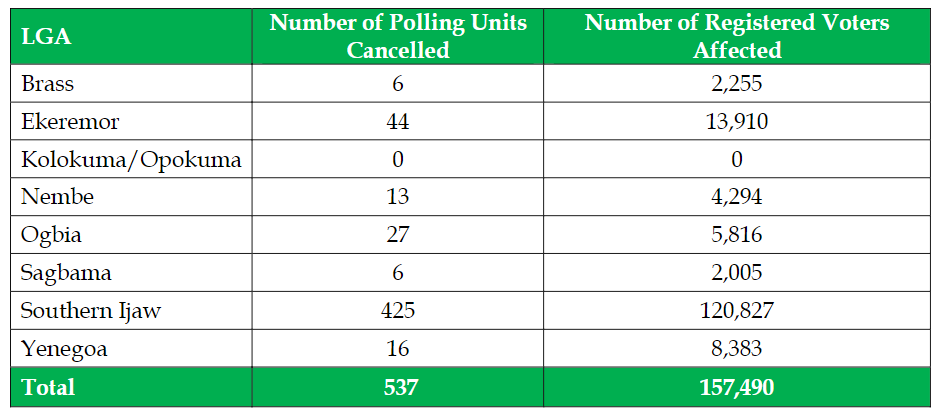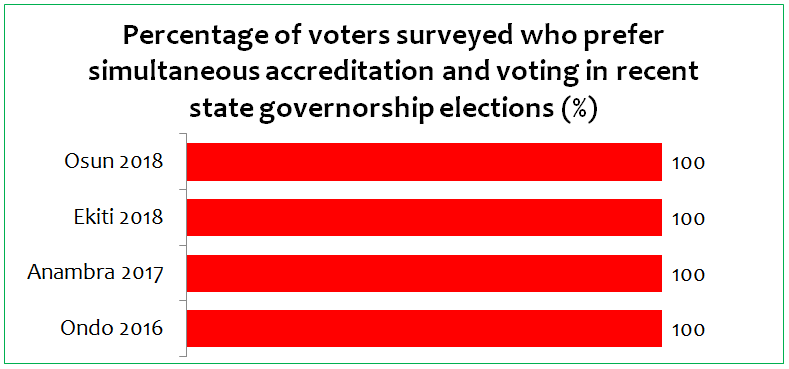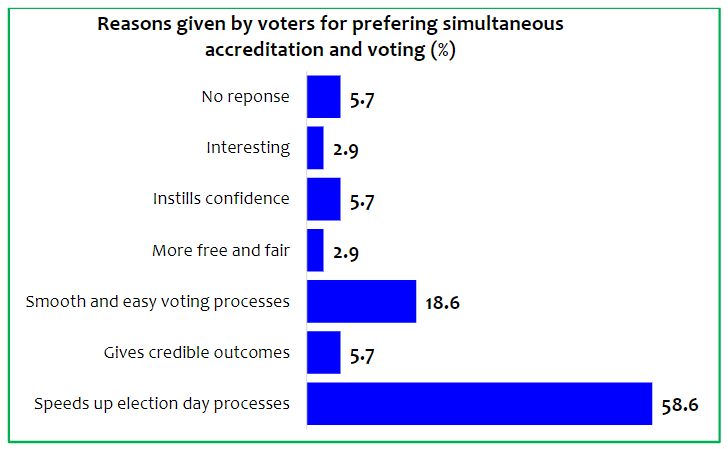On Monday 14th
January 2019, the Independent National Electoral Commission (INEC) released its
Guidelines for the conduct of the 2019 Nigerian Elections. However there have
been some controversies surrounding the ‘Guidelines’ with some political
parties insisting that certain adjustments need to be made to the document to
permit the document to be used for the conduct of the forthcoming elections. It
should be noted that INEC has taken into consideration most of the observations
made by the various stakeholders (including the political parties). However one
of the major areas of concern for the aggrieved political parties is INEC’s
insistence to continue with Simultaneous Accreditation and Voting system (SAVs)
for Election Day conduct.
Election Monitor has
prepared this article to shed more light on why it is germane that INEC apply
the Simultaneous Accreditation and Voting system for the 2019 Nigerian General
Elections.
To begin with the
Simultaneous Accreditation and Voting system was first used (with the smart
card reader) in the Bayelsa State Governorship Rerun Election of 9th
January 2016. This was done as a result of the violence which occurred in the 5th
December 2015 Bayelsa Governorship Election. There were 157,490 registered voters who were affected by cancellations and
Southern Ijaw LGA was unable to hold elections in its entirety.
The rerun was slated for
the 9th January 2016. However, the date of expiration of the serving governor’s first
term was 14th February 2016 meaning that the last date that INEC
could conduct elections in Bayelsa was 14th January 2016. Since
the rerun was on the 9th January 2016, it left INEC with very little
room if violence repeated itself again during the rerun (since the last date
for election conduct was on the 14th January 2016). It therefore
became very necessary to devise a more efficient way to conduct the election to
ensure that activities were conducted more efficiently and during the day
because of the security implications and the riverine nature of most of the 4 LGAs, 16 RAs/Wards and 160 polling
units (with 120 polling units in Southern Ijaw LGA alone) which were cancelled
and lead to the rerun. INEC in its
wisdom and with recommendations from stakeholders decided to pilot the Simultaneous
Accreditation and Voting system in the Bayelsa Governorship Re-run Election
2016. The pilot was a huge success and this lead to INEC formally making the
Simultaneous Accreditation and Voting system a part of its guidelines for the
conduct of elections. This was made known to the public via many media
engagements as well as in the Commission’s regular meetings with political
parties, civil society, the media and other stakeholders. The INEC bulletin
dated 26th April 2016 Volume 1, No. 840 clearly shows the
Commission’s intention to deploy Simultaneous Accreditation and Voting system
in subsequent elections.
INDEPENDENT NATIONAL ELECTORAL COMMISSION
DAILY
BULLETIN
VOLUME: 1 N0.: 840 DATE:
27 / 04 / 2016
INEC RELEASES SUPPLEMENTARY GUIDELINES AND REGULATIONS FOR
CONDUCT OF ELECTIONS
The Independent National Electoral Commission (INEC) has released additional guidelines to the
existing 2015 Guidelines and Regulations for the conduct of
elections in the country.
Having approved the pilot of the Continuous Accreditation and
Voting Procedure at elections, for the time being, the Commission has decided
that the following shall constitute a supplement to the existing guidelines and
regulations at elections.
The Commission stressed that: “all procedures specified in the Guidelines
and Regulations for the Conduct of the 2015 General Elections remain
in effect with the following exceptions:
a) Voting shall be by the Continuous
Accreditation and Voting System;
b) The accreditation process shall comprise
authentication and verification of voters using the Smart Card Reader (SCR),
checking of the Register of Voters, and inking of the cuticle of the specified
finger;
c) The ballot paper shall be issued in the
prescribed manner by the Presiding Officer of a Polling Unit/Voting Point
(Settlement) of the FCT, and the Assistant Presiding Officer, APO (VP), in the
case of a Voting Point (VP).
d) Accreditation and Voting shall commence at
8.00 am and close at 2.00 p.m. provided that any voters already in the queue
shall be granted access to Accreditation and Voting in the prescribed manner.
e) The Polling Unit layout shall require the
Presiding Officer to sit next to the APO II;
f) The Presiding Officer shall act as the
Overseer.
It is important to ask why
a procedure which has been in place since 2016 is just been challenged in 2019
just under a month to the first set of elections. It is also instructive to
note that this procedure has been used to conduct elections in 6 off-cycle
governorship elections as well as over 180 constituency elections since 2015. A
plethora of political parties have been involved in these elections and at no
time was there any suggestion that this procedure was in any way adverse to the
conduct of free, fair and credible elections. Therefore INEC cannot be blamed
for going ahead with this procedure going into the 2019 Nigerian General
Elections.
However there are some
pertinent reasons why Election Monitor is of the opinion that the Simultaneous
Accreditation and Voting procedure as provided by INEC in its 2019 General
Elections Guidelines is in order. It should be noted that all these points were
obtained as a result of Election Monitor’s observation of a plethora of
elections in which this procedure was used. The remainder of this article will
focus on the improvements that the Simultaneous Accreditation and Voting system
has brought to the Nigerian electoral process.
To start with, it’s
important to note that since the introduction of Simultaneous Accreditation and
Voting, elections have experienced much faster closing times. The table below
shows the observed (by Election Monitor Accredited Election Observer Group)
closing times in some recent governorship elections in Nigeria where this
procedure was utilized.
State Governorship Elections
|
Percentage of polling units which
closed by the stated times
|
Ondo 2016
|
98.5% polling units by 3pm
|
Anambra 2017
|
91.8% polling units by 3pm
|
Ekiti 2018
|
81.3% polling units by 3pm
|
Osun 2018
|
89.7% polling units by 4pm
|
Clearly it can be seen
that since the adoption of the Simultaneous Accreditation and Voting system
that elections are closing much earlier. This is certainly a far cry from
elections in 2015 and earlier where sometimes voting gets concluded in the
early evening or in some cases even at night.
The second major issue
relates to the difference between the total number of accredited voters and
total votes cast in elections. The chart below shows that on average 93% of
voters returned to vote after accreditation during the 2015 Nigerian General
Elections. This is not encouraging in any way because it means 7% of accredited voters (i.e. 2,222,254 people) did not come back to
vote after they were accredited. Considering that the difference between the
runner up and winner of the presidential election was 2,571,759, this number of people if they had voted could have had a
significant effect on the election. There was clearly apathy amongst voters in
some locations who may have not bothered to return back to vote especially in
places where voting went on into the night. It is therefore very important that
this gap is reduced as much as possible going forward. A simultaneous
accreditation and voting procedure would certainly significantly contribute
towards ensuring more voter inclusive elections since many more citizens would
actually vote.
Chart
showing voters who returned to vote after accreditation during the 2015
Nigerian General Elections
Thirdly, it is also
important to state that the INEC Smart Card Reader shows the number of
accreditations at any point in time. The implication of this is that political
parties via their agents could confirm the number of voters accredited from the
smart card reader display. As a result party agents could track the
accreditation themselves and raise alarm when there are any observed
discrepancies. Having this understanding would clearly show that there is no
need to separate accreditation and voting. As a result of this, the political
parties do not need to entertain any fear about total number of accredited
voters, as long as they have functional and competent party agents in each
polling unit.
INEC
Smart Card Reader display (this snapshot was taken during the 2016 Edo State
Governorship Election)
Another important issue is
the citizen perception of the Simultaneous Accreditation and Voting system
which should be considered above every other stakeholder. It is important to
note that democracy is first to serve the people and for this reason the will
of the people is paramount. If voters are saying that a procedure is more
convenient for them then it behooves all stakeholders to consider the will of
the people above that of any other stakeholder. Below are charts showing the
results of surveys conducted by Election Monitor observers in recently
concluded governorship elections (Ondo 2016, Anambra 2017, Ekiti 2018 and Osun
2018). The focus of the surveys was to discover whether the citizens prefer the
Simultaneous Accreditation and Voting system or the old system where there was
a dichotomy of both activities. Clearly from these charts Nigerian citizens are
in significant support of this procedure and it is only appropriate that INEC
deploy this system in the 2019 General elections in line with the will of the
voters.
Ondo 2016
Anambra 2017
Ekiti 2018
Osun 2017
The Independent National
Electoral Commission (INEC) has also recently begun the deployment of the
enhanced smart card reader. The most significant impact of this is the drastic
reduction of finger print rejection rates seen in elections where these card
readers have been used. For example Election Monitor accredited election observation
group observed some polling units with a very high finger print rejection rate
during the 2016 Edo State Governorship Election (some over 30%). However
fast-forward to Ekiti and Osun Governorship elections of 2018, EM observers
didn’t find any polling unit with a finger rejection rate of upto 3%. Clearly
the enhanced smart card readers are contributing to voter inclusion and more
effective and transparent conduct of elections.
There have also been some
claims that overvoting would be more difficult to track using the Simultaneous
Accreditation and Voting system. However the facts don’t support this. In fact
overvoting has become very easy to identify which has lead to many election
riggers abandoning the idea. For example looking at the 2017 Anambra
Governorship Election there were 113,682
voters who were affected by cancellations. Because the elections were very
peaceful most of these cancellations related to overvoting and other
non-violent election malpractices. This clearly shows that every attempt at
overvoting would be nullified and have no effect on the election. Consequently
no political party would need to entertain any fear about overvoting being more
pervasive using the Simultaneous Accreditation and Voting system because this
system actually ensures that overvoting is always detected and therefore has no
way of influencing the election outcome. Perhaps this may have also contributed
to the significantly reduced number of cancellations in the Ekiti and Osun 2018
governorship elections. In fact the Osun 2018 Governorship election was
reported to have only one case of overvoting out of 3010 polling units where
elections were conducted. From all of these it is clear that incidences of overvoting
would not increase as a result of the implementation of Simultaneous
Accreditation and Voting system in the 2019 Nigerian General Elections.
It’s also important to
state that the views of all political parties need to be considered not just a
large number of the political parties. This is because there may be coalitions
within the political parties which have a particular political leaning. While
these may be numerically large they may not represent the spread of other
political parties which have smaller coalitions or even no coalition at all. So
INEC would be expected to have taken into consideration the spread of opinion
and not just the number of political parties who have an opinion. Clearly
INEC’s final released guidelines for the 2019 General Elections has taken into
consideration the broad opinions of most of the political parties while
considering other stakeholders and the ultimate impact on the entire electoral
process.
In summary it is Election
Monitor’s considered opinion that the Independent National Electoral Commission
(INEC) has not erred by maintaining Simultaneous Accreditation and Voting
system in its Guidelines for the 2019 General Elections in Nigeria. Election
Monitor actually expects this procedure to actually make the upcoming elections
much more credible and efficient.













No comments:
Post a Comment